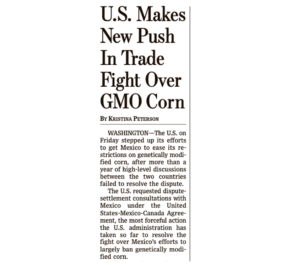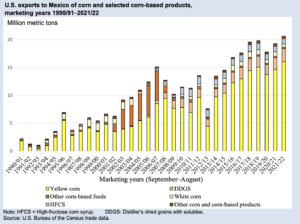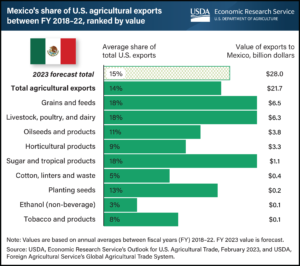President Donald Trump on Friday signed an executive order temporarily expanding the amount of beef the U.S. can import from Argentina, a move the White House says is aimed at…
U.S. Requests USMCA Dispute Settlement Consultations on Mexico’s Ag Biotech Measures
Kristina Peterson reported in Saturday’s Wall Street Journal that, “The U.S. on Friday stepped up its efforts to get Mexico to ease its restrictions on genetically modified corn, after more than a year of high-level discussions between the two countries failed to resolve the dispute.
The U.S. requested dispute-settlement consultations with Mexico under the United States-Mexico-Canada Agreement, the most forceful action the U.S. administration has taken so far to resolve the fight over Mexico’s efforts to largely ban genetically modified corn.
“‘The United States has repeatedly conveyed its concerns that Mexico’s biotechnology policies are not based on science and threaten to disrupt U.S. exports to Mexico to the detriment of agricultural producers,’ U.S. Trade Representative Katherine Tai said.”

Peterson explained that, “U.S. trade and agriculture officials have been trying to persuade the administration of Mexican President Andrés Manuel López Obrador to abandon its plans to ban imports of genetically modified corn.”
Saturday’s article noted that, “More than 90% of corn grown in the U.S. is genetically modified, according to the National Corn Growers Association.
“Under the USMCA trade agreement, the U.S. and Mexico must start consultations within 30 days.
“Trade groups and lawmakers representing U.S. farmers had long been pushing the administration to take this step, saying the ban threatens to harm U.S. corn farmers and disrupt the two countries’ trade relationship.”

The Journal article pointed out that, “In December 2020, López Obrador signed a decree to phase out the use of genetically modified corn in Mexico by January 2024. Mexican officials have said that their aim is to protect Mexico’s native corn varieties and that their policies are in keeping with the USMCA trade agreement.
“In February, Mexico issued a modified decree that banned genetically modified corn for human consumption in dough and tortillas and said that it would gradually ban genetically modified corn for animal feed.
“Mexican officials have said their country already produces more of the white corn used for tortillas than it consumes, while corn imported from the U.S. is for livestock feed and industrial uses.”

And Reuters writer Cassandra Garrison reported on Friday that, “The consultation request comes as the North American neighbors inch toward a full-blown trade dispute under the U.S.-Mexico-Canada Agreement (USMCA) over Mexico’s policies to limit the use of GM corn, which it imports from the U.S.
“If the consultations fail to resolve disagreements within 75 days, Washington can request a dispute settlement panel to decide the case.”
The Reuters article pointed out that, “The United States requested formal trade consultations in March over objections to Mexico’s plans to limit imports of GM corn and other agricultural biotechnology products. Those consultations took place, but failed to resolve the matter, senior officials of the U.S. Trade Representative’s office said.”
“Some sector experts have expressed concern that the move could set a precedent among other countries, which would disrupt the global corn trade,” the article said.
In a statement Friday, Secretary of Agriculture Tom Vilsack indicated that, “USDA supports success for all farmers, and that means embracing fair, open, science- and rules-based trade. In this spirit, the USMCA was written to ensure that producers in all three countries have full and fair access to each other’s markets.
“We fundamentally disagree with the position Mexico has taken on the issue of biotechnology, which has been proven to be safe for decades. Through this action, we are exercising our rights under USMCA while supporting innovation, nutrition security, sustainability, and the mutual success of our farmers and producers.”





